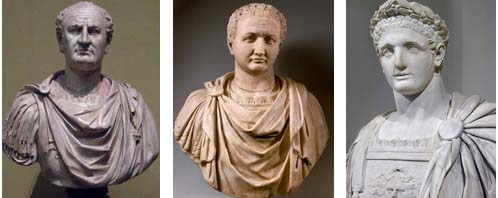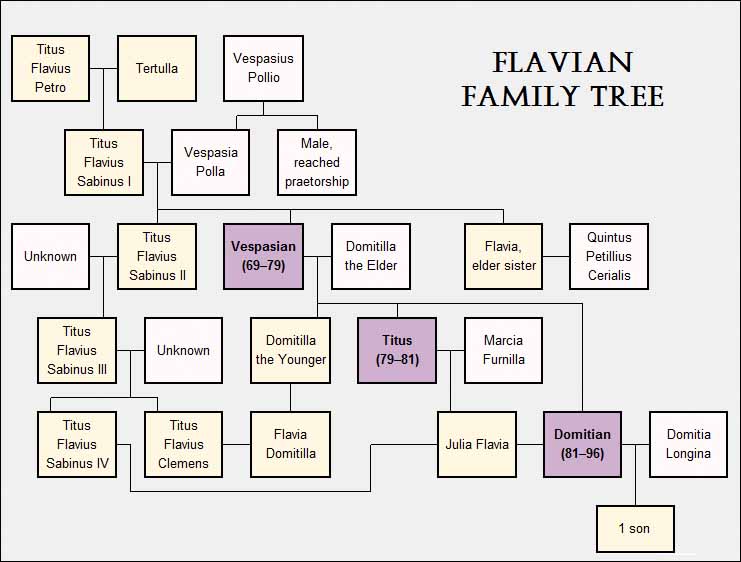


The Flavian dynasty was a Roman Imperial Dynasty, which ruled the Roman Empire between 69 and 96 AD, encompassing the reigns of Vespasian (69-79), and his two sons Titus (79-81) and Domitian (81-96).
The Flavians rose to power during the civil war of 69, known as the Year of the Four Emperors. After Galba and Otho died in quick succession, Vitellius became emperor in mid 69. His claim to the throne was quickly challenged by legions stationed in the Eastern provinces, who declared their commander Vespasian Emperor in his place.
The Second Battle of Bedriacum tilted the balance decisively in favor of the Flavian forces, who entered Rome on December 20. The following day, the Roman Senate officially declared Vespasian emperor of the Roman Empire, thus commencing the Flavian dynasty. Although the dynasty proved to be short-lived, several significant historic, economic and military events took place during their reign.
The reign of Titus was struck by multiple natural disasters, the most severe of which was the eruption of Mount Vesuvius in 79. The surrounding cities of Pompeii and Herculaneum were completely buried under ash and lava. One year later, Rome was struck by fire and a plague. On the military front, the Flavian dynasty witnessed the siege and destruction of Jerusalem by Titus in 70, following the failed Jewish rebellion of 66.
Substantial conquests were made in Britain under command of Gnaeus Julius Agricola between 77 and 83, while Domitian was unable to procure a decisive victory against King Decebalus in the war against the Dacians. In addition, the Empire strengthened its border defenses by expanding the fortifications along the Limes Germanicus.
The Flavians initiated economic and cultural reforms. Under Vespasian, new taxes were devised to restore the Empire's finances, while Domitian revalued the Roman coinage by increasing its silver content. A massive building programme was enacted to celebrate the ascent of the Flavian dynasty, leaving multiple enduring landmarks in the city of Rome, the most spectacular of which was the Flavian Amphitheatre, better known as the Colosseum.
Flavian rule came to an end on September 18, 96, when Domitian was assassinated. He was succeeded by the longtime Flavian supporter and advisor Marcus Cocceius Nerva, who founded the long-lived Nervan-Antonian dynasty.
Decades of civil war during the 1st century BC had contributed greatly to the demise of the old aristocracy of Rome, which was gradually replaced in prominence by a new Italian nobility during the early part of the 1st century AD. One such family were the Flavians, or gens Flavia, which rose from relative obscurity to prominence in just four generations, acquiring wealth and status under the emperors of the Julio-Claudian dynasty.
Vespasian's grandfather, Titus Flavius Petro, had served as a centurion under Pompey during Caesar's civil war. His military career ended in disgrace when he fled the battlefield at the Battle of Pharsalus in 48 BC. Nevertheless, Petro managed to improve his status by marrying the extremely wealthy Tertulla, whose fortune guaranteed the upwards mobility of Petro's son Titus Flavius Sabinus I. Sabinus himself amassed further wealth and possible equestrian status through his services as tax collector in Asia and banker in Helvetia (modern Switzerland)). By marrying Vespasia Polla he allied himself to the more prestigious patrician gens Vespasia, ensuring the elevation of his sons Titus Flavius Sabinus II and Vespasian to the senatorial rank.
Around 38 AD, Vespasian married Domitilla the Elder, the daughter of an equestrian from Ferentium. They had two sons, Titus Flavius Vespasianus (born in 39) and Titus Flavius Domitianus (born in 51), and a daughter, Domitilla (born in 45). Domitilla the Elder died before Vespasian became emperor. Thereafter his mistress Caenis was his wife in all but name until she died in 74.
The political career of Vespasian included the offices of quaestor, aedile and praetor, and culminated with a consulship in 51, the year Domitian was born. As a military commander, he gained early renown by participating in the Roman invasion of Britain in 43. Nevertheless, ancient sources allege poverty for the Flavian family at the time of Domitian's upbringing, even claiming Vespasian had fallen into disrepute under the emperors Caligula (37-41) and Nero (54-68).
Modern history has refuted these claims, suggesting these stories were later circulated under Flavian rule as part of a propaganda campaign to diminish success under the less reputable Emperors of the Julio-Claudian dynasty, and maximize achievements under Emperor Claudius (41-54) and his son Britannicus. By all appearances, imperial favor for the Flavians was high throughout the 40s and 60s. While Titus received a court education in the company of Britannicus, Vespasian pursued a successful political and military career. Following a prolonged period of retirement during the 50s, he returned to public office under Nero, serving as proconsul of the Africa province in 63, and accompanying the emperor during an official tour of Greece in 66.
From c. 57 to 59, Titus was a military tribune in Germania, and later served in Britannia. His first wife, Arrecina Tertulla, died two years after their marriage, in 65. Titus then took a new wife of a more distinguished family, Marcia Furnilla. However, Marcia's family was closely linked to the opposition to Emperor Nero. Her uncle Barea Soranus and his daughter Servilia were among those who were killed after the failed Pisonian conspiracy of 65.
Some modern historians theorize that Titus divorced his wife because of her family's connection to the conspiracy. He never re-married. Titus appears to have had multiple daughters, at least one of them by Marcia Furnilla. The only one known to have survived to adulthood was Julia Flavia, perhaps Titus's child by Arrecina, whose mother was also named Julia. During this period Titus also practiced law and attained the rank of quaestor.
In 66, the Jews of the Judaea Province revolted against the Roman Empire. Cestius Gallus, the legate of Syria, was forced to retreat from Jerusalem and defeated at the battle of Beth-Horon. The pro-Roman king Agrippa II and his sister Berenice fled the city to the Galilee where they later gave themselves up to the Romans. Nero appointed Vespasian to put down the rebellion, who was dispatched to the region at once with the fifth and tenth legions. He was later joined by Titus at Ptolemais, bringing with him the fifteenth legion. With a strength of 60,000 professional soldiers, the Romans quickly swept across the Galilee, and by 68 marched on Jerusalem.
On 9 June 68, amidst growing opposition of the Senate and the army, Nero committed suicide, and with him the Julio-Claudian dynasty came to an end. Chaos ensued, leading to a year of brutal civil war known as the Year of the Four Emperors, during which the four most influential generals in the Roman Empire - Galba, Otho, Vitellius and Vespasian - successively vied for the imperial power. News of Nero's death reached Vespasian as he was preparing to besiege the city of Jerusalem.
Almost simultaneously the Senate had declared Galba, then governor of Hispania Tarraconensis (modern Spain), as Emperor of Rome. Rather than continue his campaign, Vespasian decided to await further orders and send Titus to greet the new Emperor. Before reaching Italy however, Titus learnt that Galba had been murdered and replaced by Otho, the governor of Lusitania (modern Portugal). At the same time Vitellius and his armies in Germania had risen in revolt, and prepared to march on Rome, intent on overthrowing Otho. Not wanting to risk being taken hostage by one side or the other, Titus abandoned the journey to Rome and rejoined his father in Judaea.
Otho and Vitellius realized the potential threat posed by the Flavian faction. With four legions at his disposal, Vespasian commanded a strength of nearly 80,000 soldiers. His position in Judaea further granted him the advantage of being nearest to the vital province of Egypt, which controlled the grain supply to Rome. His brother Titus Flavius Sabinus II, as city prefect, commanded the entire city garrison of Rome.
Tensions among the Flavian troops ran high, but as long as Galba and Otho remained in power, Vespasian refused to take action.[ When Otho was defeated by Vitellius at the First Battle of Bedriacum however, the armies in Judaea and Egypt took matters into their own hands and declared Vespasian emperor on 1 July 69. Vespasian accepted, and entered an alliance with Gaius Licinius Mucianus, the governor of Syria, against Vitellius. A strong force drawn from the Judaean and Syrian legions marched on Rome under the command of Mucianus, while Vespasian himself travelled to Alexandria, leaving Titus in charge of ending the Jewish rebellion.
In Rome meanwhile, Domitian was placed under house arrest by Vitellius, as a safeguard against future Flavian aggression. Support for the old emperor was waning however, as more legions throughout the empire pledged their allegiance to Vespasian.
On 24 October 69 the forces of Vitellius and Vespasian clashed at the Second Battle of Bedriacum, which ended in a crushing defeat for the armies of Vitellius. In despair, he attempted to negotiate a surrender. Terms of peace, including a voluntary abdication, were agreed upon with Titus Flavius Sabinus II, but the soldiers of the Praetorian Guard - the imperial bodyguard - considered such a resignation disgraceful, and prevented Vitellius from carrying out the treaty.
On the morning of 18 December, the emperor appeared to deposit the imperial insignia at the Temple of Concord, but at the last minute retraced his steps to the imperial palace. In the confusion, the leading men of the state gathered at Sabinus' house, proclaiming Vespasian Emperor, but the multitude dispersed when Vitellian cohorts clashed with the armed escort of Sabinus, who was forced to retreat to the Capitoline Hill. During the night, he was joined by his relatives, including Domitian.
The armies of Mucianus were nearing Rome, but the besieged Flavian party did not hold out for longer than a day. On 19 December, Vitellianists burst onto the Capitol, and in the resulting skirmish, Sabinus was captured and executed. Domitian himself managed to escape by disguising himself as a worshipper of Isis, and spent the night in safety with one of his father's supporters.
By the afternoon of 20 December Vitellius was dead, his armies having been defeated by the Flavian legions. With nothing more to be feared from the enemy, Domitian came forward to meet the invading forces; he was universally saluted by the title of Caesar, and the mass of troops conducted him to his father's house. The following day, 21 December, the Senate proclaimed Vespasian emperor of the Roman Empire.
Although the war had officially ended, a state of anarchy and lawlessness pervaded in the first days following the demise of Vitellius. Order was properly restored by Mucianus in early 70, who headed an interim government with Domitian as the representative of the Flavian family in the Senate. Upon receiving the tidings of his rival's defeat and death at Alexandria, the new Emperor at once forwarded supplies of urgently needed grain to Rome, along with an edict or a declaration of policy, in which he gave assurance of an entire reversal of the laws of Nero, especially those relating to treason.
In early 70, Vespasian was still in Egypt however, continuing to consolidate support from the Egyptians before departing. By the end 70, he finally returned to Rome, and was properly installed as Emperor.